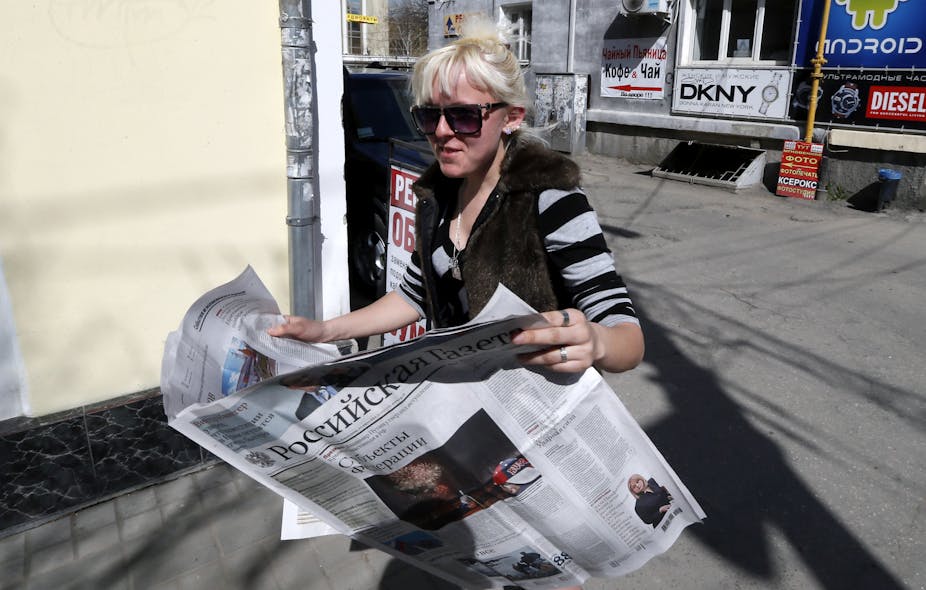Facebook can be a confusing place. For the follower of Ukrainian and Russian politics the messages could not be more different. At the same time that “Euromaidan PR” is posting pictures of “Putler” and accusing Russia of being a sick, backwards imperial bully, “Voice of Russia” is relaying to the world how Ukraine is overrun by fascists, bankrolled by the US and the EU, and at the point of political and economic ruin.
I used to be of the opinion that propaganda was more sophisticated in 2014 than in 1944. The current media war appears to tell a different story.
To get a sense of the levels of absurdity the propaganda has reached, one need look no further than the Voice of Russia, a Kremlin-sponsored, international media outlet that claims to have 109m listeners worldwide. International it might be, but objective it certainly is not. Voice of Russie is an integral part of Moscow’s concerted campaign to increase its “soft power” abroad. Linked with other international media, cultural foundations, and business organisations, Voice of Russia aims to promote a more positive image of Russia to the world, and to move beyond Cold War stereotypes.
However, such stereotypes have become a recent staple for Russian media outlets that have been increasingly subservient to Vladimir Putin’s ever-more authoritarian regime. In recent days three overarching themes dominate Voice of Russia reporting. First, the West (especially America) is evil, duplicitous, greedy, and arrogant. Second, Russia (especially Putin) is strong, righteous, and morally superior to the west.

Third, these two main stances are justified by asserting vigorously that Ukraine is overrun by anarchic fascists, anti-Semites, and haters of everything Russian. The fact that the West has supported these “fascists”, while Russia is gallantly trying to protect Russians and Russian-speakers, is cited as concrete proof that the West is indeed morally bankrupt, but Russia is acting entirely honourably.
Friends reunited
But don’t take my word for it. Here are some of the headlines from Voice of Russia’s Facebook feed from the past week: “Fascism seeps into America amid Ukraine crisis”, “Putin’s rating has hit a five-year high”, “Obama’s presidency … has been a force of pure evil”, “Crimea re-joins Russia after US/Nazi coup in Ukraine”. The list could go on. Most commonly, Voice of Russia hands over space to dubious western “experts” with extreme views who are happy to berate the United States of America and who presumably know very little about Ukraine and the events in Kiev or Crimea.
Of course there is little point discussing the journalistic or moral credibility of Voice of Russia, or the various other domestic and international media sources that are similarly being filled with such blatant propaganda. Many, such as Stopfake.org, are rigorously attempting to counter Russian propaganda by exposing the inconsistencies, biases, and factual inaccuracies of the media coverage. Nevertheless, while most commentators can see this propaganda for what it is, it still has a number of grave consequences.
These messages appear to be going down rather well in Russia. The cynic might note that Russian media and the Kremlin have been gearing up for this heightened propaganda war well in advance of the Ukraine crisis. In recent years the authorities have steadily been ratcheting up their anti-western rhetoric, promoting instead traditional “Russian values” of heterosexuality, sovereign democracy, and Orthodoxy. This has been a useful means to ensure domestic support.
A pressing question is how to deal with this media onslaught. Fight fire with fire perhaps as a number of Ukrainian social media groups are attempting to do? The problem with this is that we can fall into the same trap of overt subjectivity. A group of respected academics and experts on Ukraine signed an online petition asking western media sources to stop focusing exclusively on the role of the far-right in the Maidan protests, arguing that this plays into the hands of the Kremlin.
This demonstrates the power of Russia’s propaganda. It forces many to adopt a fully subjective and partisan position. Knowing that the Kremlin’s well-oiled propaganda machine will instantly seize upon any negative reporting or commentary of the role of the far-right in Ukraine, shouldn’t we just focus on the democratic majority that characterised the Maidan movement?
But this retreat into subjectivity would signal a major victory for Putin’s efficient media structures. Russia’s incessant propaganda is devalued because it lacks credibility. Scholarly and journalistic scrutiny of Russia must be accompanied by open debate, self-criticism, and honest reflection. These democratic principles are intolerable in a functioning authoritarian regime.
We should therefore admit that: yes, the USA and other European countries have often acted poorly on the international stage; yes, the IMF can be a disruptive and deeply problematic entity; yes the EU did not sufficiently take into account Russian interests and concerns in Ukraine; and yes, there are many aspects of Ukraine’s domestic politics that are deeply troubling.
By admitting and debating these issues we will be able to state with moral authority that: no, Ukraine is not overrun by fascists; no, Russia is not acting in the best interests of its compatriots; no, it is not acceptable to violate the territorial integrity of another country; and no, the Crimean referendum was in no way constitutional, moral, or democratic.

